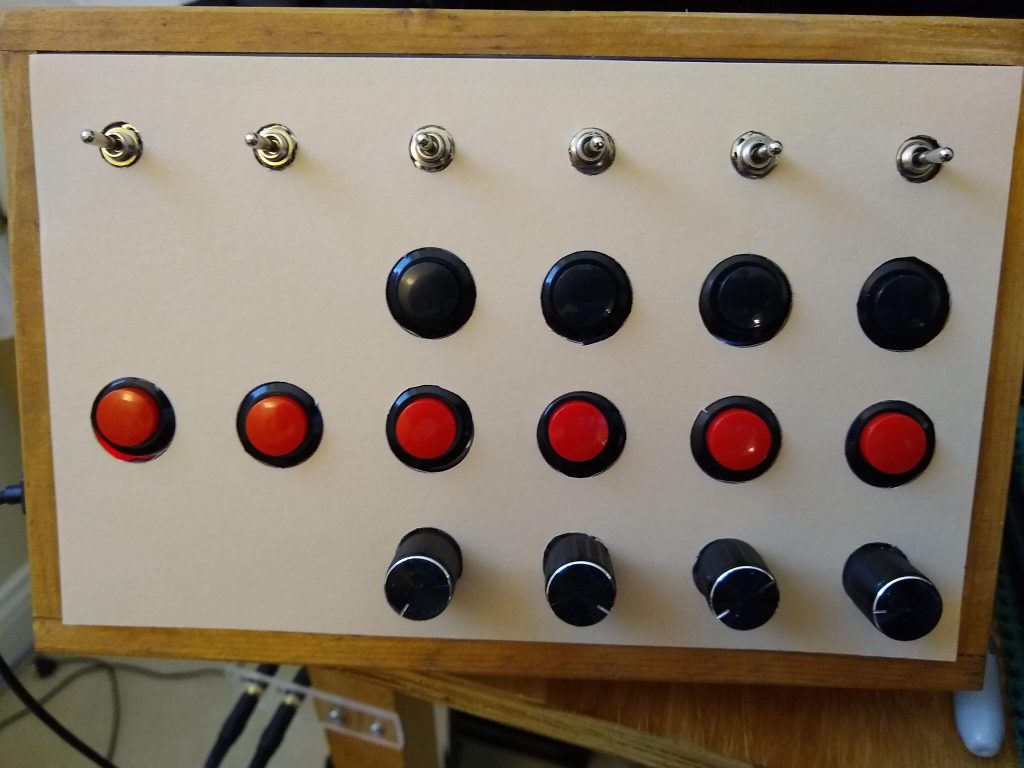
I just saw an ad for one of the commercial button boxes and they listed a great new feature – get more outputs from the rotary encoders by using their push buttons as shift keys. A great addition to my original button box.
As I’d recently been thinking about wanting more rotary encoders and having more buttons than I knew what to do with, I thought it was a great idea to sacrifice four of the buttons to get four more rotary encoders.
It was just a simple matter of tracking the state of the four buttons and using that info to send different codes for the encoders if they were pressed. I’m still sending the button presses as well, so I can still choose whether to use the extra encoders or the buttons when I assign the buttons to controls in game.
There’s not all that much to doing a button box, so I’ll just publish the code here.
//BUTTON BOX
//USE w ProMicro
//Tested in WIN10 + Assetto Corsa
//AMSTUDIO
//20.8.17
// YouTube video: https://www.youtube.com/watch?v=Z7Sc4MJ8RPM
// 10/06/2019
// Bill Smithem
// Added additional button
// 4/4/2020
// Bill Smithem
// set debounce time to 50 (default was 10)
// 01/21/2021
// Bill Smtihem
// add "4 func" rotaries - different code sent if button pressed while turning. Tracked state of buttons 21-24
// and used that to "shift" the rotary encoders. Note: we're still sending the button presses for the rotary
// encoders, so mind that when assigning buttons in game.
// Number of "buttons" goes from 33 to 41
#include <Arduino.h>
#include <Keypad.h>
#include <Joystick.h>
#define ENABLE_PULLUPS
#define NUMROTARIES 4
#define NUMBUTTONS 25
#define NUMROWS 5
#define NUMCOLS 5
// Odd map is so buttons come out in numerical order, not scanning order. i.e. top left button is one, next is
// two, etc. Just wired in the most convenient fashion and worked it out in the map.
byte buttons[NUMROWS][NUMCOLS] = {
{5, 6, 17, 23, 12},
{3, 4, 16, 22, 11},
{9, 10, 19, 20, 14},
{1, 2, 15, 21, 0},
{7, 8, 18, 24, 13},
};
struct rotariesdef {
byte pin1;
byte pin2;
int ccwchar; // send this for CCW
int cwchar; // this for CW
int ccwPchar; // this for CCW with button pressed
int cwPchar; // and this for CW with button pressed
volatile unsigned char state;
};
rotariesdef rotaries[NUMROTARIES] {
{0, 1, 32, 31, 40, 39, 0},
{2, 3, 29, 30, 38, 37, 0},
{4, 5, 27, 28, 36, 35, 0},
{6, 7, 25, 26, 34, 33, 0},
};
#define DIR_CCW 0x10
#define DIR_CW 0x20
#define R_START 0x0
#ifdef HALF_STEP
#define R_CCW_BEGIN 0x1
#define R_CW_BEGIN 0x2
#define R_START_M 0x3
#define R_CW_BEGIN_M 0x4
#define R_CCW_BEGIN_M 0x5
const unsigned char ttable[6][4] = {
// R_START (00)
{R_START_M, R_CW_BEGIN, R_CCW_BEGIN, R_START},
// R_CCW_BEGIN
{R_START_M | DIR_CCW, R_START, R_CCW_BEGIN, R_START},
// R_CW_BEGIN
{R_START_M | DIR_CW, R_CW_BEGIN, R_START, R_START},
// R_START_M (11)
{R_START_M, R_CCW_BEGIN_M, R_CW_BEGIN_M, R_START},
// R_CW_BEGIN_M
{R_START_M, R_START_M, R_CW_BEGIN_M, R_START | DIR_CW},
// R_CCW_BEGIN_M
{R_START_M, R_CCW_BEGIN_M, R_START_M, R_START | DIR_CCW},
};
#else
#define R_CW_FINAL 0x1
#define R_CW_BEGIN 0x2
#define R_CW_NEXT 0x3
#define R_CCW_BEGIN 0x4
#define R_CCW_FINAL 0x5
#define R_CCW_NEXT 0x6
const unsigned char ttable[7][4] = {
// R_START
{R_START, R_CW_BEGIN, R_CCW_BEGIN, R_START},
// R_CW_FINAL
{R_CW_NEXT, R_START, R_CW_FINAL, R_START | DIR_CW},
// R_CW_BEGIN
{R_CW_NEXT, R_CW_BEGIN, R_START, R_START},
// R_CW_NEXT
{R_CW_NEXT, R_CW_BEGIN, R_CW_FINAL, R_START},
// R_CCW_BEGIN
{R_CCW_NEXT, R_START, R_CCW_BEGIN, R_START},
// R_CCW_FINAL
{R_CCW_NEXT, R_CCW_FINAL, R_START, R_START | DIR_CCW},
// R_CCW_NEXT
{R_CCW_NEXT, R_CCW_FINAL, R_CCW_BEGIN, R_START},
};
#endif
byte rowPins[NUMROWS] = {21, 20, 19, 18, 15};
byte colPins[NUMCOLS] = {14, 16, 10, 9, 8};
Keypad buttbx = Keypad( makeKeymap(buttons), rowPins, colPins, NUMROWS, NUMCOLS);
Joystick_ Joystick(JOYSTICK_DEFAULT_REPORT_ID,
JOYSTICK_TYPE_JOYSTICK, 41, 0,
false, false, false, false, false, false,
false, false, false, false, false);
void setup() {
void rotary_init();
Joystick.begin();
rotary_init();
buttbx.setDebounceTime(50);
}
void loop() {
void CheckAllEncoders();
void CheckAllButtons();
CheckAllEncoders();
CheckAllButtons();
}
// keep state of last four buttons (ones attached to rotaries)
KeyState rbState[] = { RELEASED, RELEASED, RELEASED, RELEASED };
void CheckAllButtons(void) {
int kc;
if (buttbx.getKeys())
{
for (int i = 0; i < LIST_MAX; i++)
{
if ( buttbx.key[i].stateChanged )
{
kc = buttbx.key[i].kchar - 21; // track state of buttons 21-24 (switches on rotaries)
switch (buttbx.key[i].kstate) {
case PRESSED:
case HOLD:
Joystick.setButton(buttbx.key[i].kchar, 1);
if (kc >= 0)
rbState[kc] = PRESSED;
break;
case RELEASED:
case IDLE:
Joystick.setButton(buttbx.key[i].kchar, 0);
if (kc >= 0)
rbState[kc] = RELEASED;
break;
}
}
}
}
}
void rotary_init() {
for (int i = 0; i < NUMROTARIES; i++) {
pinMode(rotaries[i].pin1, INPUT);
pinMode(rotaries[i].pin2, INPUT);
#ifdef ENABLE_PULLUPS
digitalWrite(rotaries[i].pin1, HIGH);
digitalWrite(rotaries[i].pin2, HIGH);
#endif
}
}
unsigned char rotary_process(int _i) {
unsigned char pinstate = (digitalRead(rotaries[_i].pin2) << 1) | digitalRead(rotaries[_i].pin1);
rotaries[_i].state = ttable[rotaries[_i].state & 0xf][pinstate];
return (rotaries[_i].state & 0x30);
}
void CheckAllEncoders(void) {
for (int i = 0; i < NUMROTARIES; i++) {
unsigned char result = rotary_process(i);
if (result == DIR_CCW) {
// check if button pressed
if (rbState[3-i] == PRESSED) {
Joystick.setButton(rotaries[i].ccwPchar, 1); delay(50); Joystick.setButton(rotaries[i].ccwPchar, 0);
} else {
Joystick.setButton(rotaries[i].ccwchar, 1); delay(50); Joystick.setButton(rotaries[i].ccwchar, 0);
}
}
if (result == DIR_CW) {
if (rbState[3-i] == PRESSED) {
Joystick.setButton(rotaries[i].cwPchar, 1); delay(50); Joystick.setButton(rotaries[i].cwPchar, 0);
} else {
Joystick.setButton(rotaries[i].cwchar, 1); delay(50); Joystick.setButton(rotaries[i].cwchar, 0);
}
}
}
}
